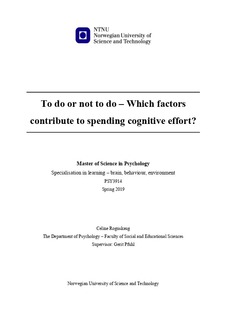| dc.description.abstract | Motivation is a central aspect of human life and is thought to be one of the factors that influences academic performance. An important aspect of motivation is cognitive effort, which is a subjective state that people have introspective access to. There is little research on whether motivation in the academic context is considered a trait or a state, so that is the focus of this paper. The purpose of the experiment was to look at different factors that could possibly affect cognitive effort spent, including feeling of control, anxiety, curiosity, procrastination and personality. A total of 38 participants completed the online survey and the results indicated a tendency towards feeling of control, which is a state, affecting cognitive effort spent. The results also indicated that states, such as anxiety, affected cognitive effort. In addition, we found that curiosity partially correlated positively with openness to experience, and that cognitive effort partially correlated negatively with conscientiousness. | nb_NO |
